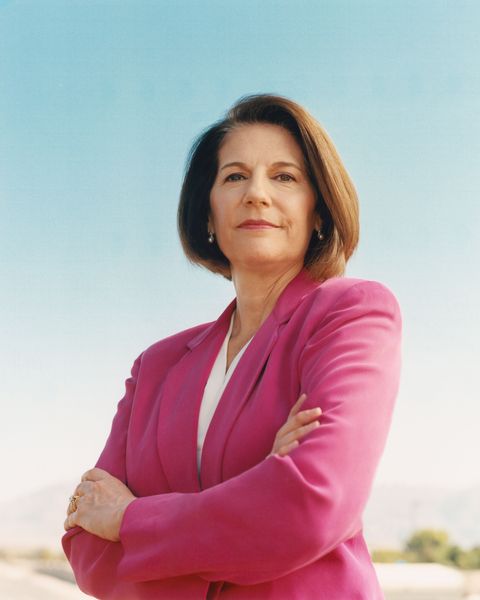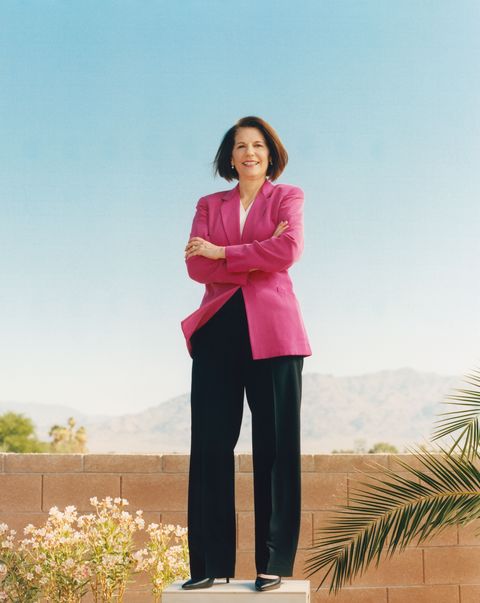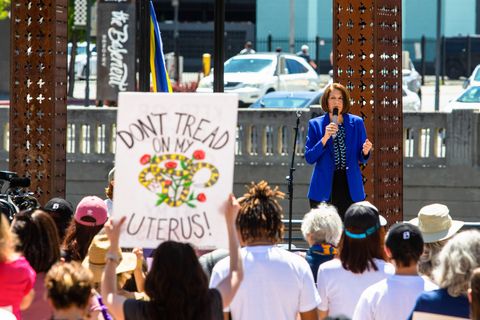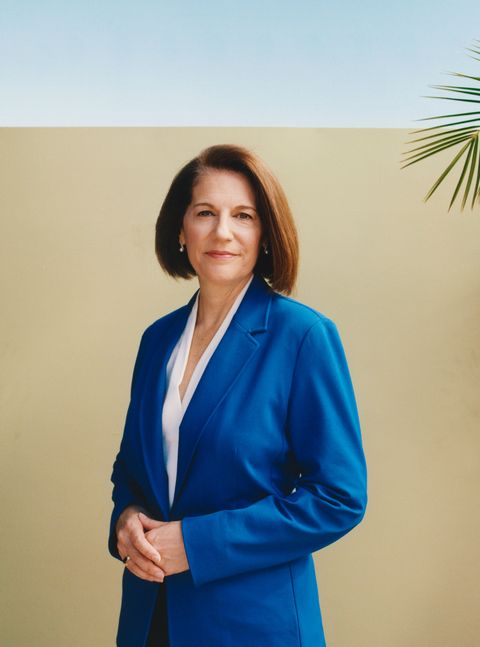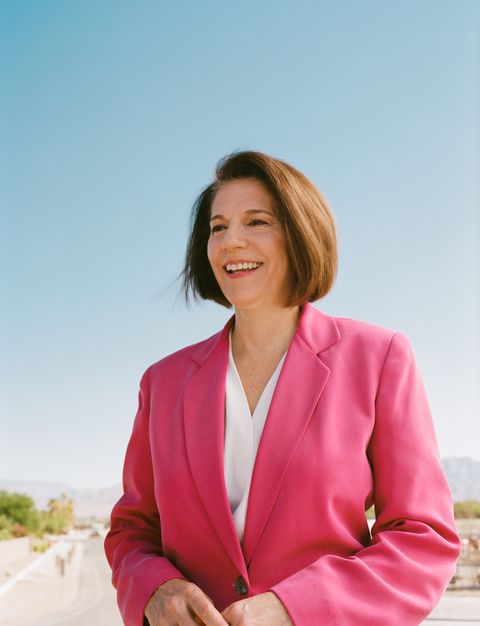Turns out I, and perhaps many of us, have been saying “Nevada” wrong. I only just learned how to correctly pronounce it this summer, during a late-morning meal with Senator Catherine Cortez Masto. We meet at one of her go-tos, the Las Vegas institution Vickie’s Diner, a soda fountain–style spot off the Strip where Elvis used to eat steak and eggs at the long wooden lunch counter that is still in use today. After she greets the diner’s namesake, Vickie Kelesis, whose family has owned the business since around 1968, Cortez Masto sits down for our interview and a Vegas-size breakfast of eggs, hash browns, and a ham steak so big it gets its own plate. In the middle of answering a long-winded question I’ve asked her, she stops to correct me: “Nevada. It’s pronounced Ne-vad-uh,” she says. I’m caught so off guard that I worry I may have said “New Mexico.”
“Oh no,” I respond, embarrassed at appearing like an out-of-touch East Coaster. “What did I say?” In my head, all goes quiet save for the short-order cook shuffling pots across his stove about 10 feet away from us. Pausing to take a sip of her coffee, she politely repeats my incorrect pronunciation: “Nuh-vah-duh.” And now I clearly hear the nuh instead of ne—as in Neve Campbell—and never again will I make that mistake. The refreshing spontaneity of this abrupt lesson says a lot about the unapologetic pride that Cortez Masto—a third-generation Nevadan—has for her home state. I’m pretty sure she’d even correct the pope, diplomatically, if he pronounced it wrong. It’s also clear she’s comfortable asserting herself in order to get her point across, even if it momentarily changes the temperature in the room. It’s a trait no doubt cultivated by years as a litigation lawyer, then as the state’s attorney general, and most recently during her history-making first term as a senator, where she’s the body’s first-ever Latina, and also the first woman from Nevada elected to the U.S. Senate. “Catherine’s historic election broke an important barrier,” says Senator Jacky Rosen, the second woman to be elected to the Senate from Nevada. “It inspired so many, particularly women of color.”
On the eve of completing her sixth year in office, Cortez Masto is running for reelection in one of the costliest midterm races in the country. It is also one of the most-watched, rated as a toss-up by the Cook Political Report and seen as having the potential, along with Senate contests in Arizona, Georgia, Pennsylvania, and Wisconsin, to shift the balance of power in Congress’s upper chamber to the GOP. The stakes may be especially high for women. “In 2017, when I first got to the Senate, had I not been there, the Republicans would have [had the votes to] repeal the Affordable Care Act,” Cortez Masto remembers. And now? “Listen, Mitch McConnell already said he would support a federal abortion ban, and there’s no doubt in my mind my opponent would be a vote for that.”
That opponent, Adam Laxalt, who succeeded Cortez Masto as Nevada’s attorney general, is everything she’s not: anti-abortion, anti-immigration, Trump-endorsed (he cochaired the former president’s reelection campaign in the state), and a 2020 election denier (he filed lawsuits to overturn the state’s results). “It’s so important that we elect people who not only recognize the importance of our democracy, but respect our system of democracy and our government,” Cortez Masto says. “Our democracy, like everywhere around the world, is fragile in the sense that we have to continue to fight for it, from within and with people who are going to be that voice, who will stand up for our ideals.”
Her commitment to democracy was reinforced in part by having been on the Senate floor on January 6, 2021, when rioters stormed the Capitol. She was about to speak in support of the electoral votes when she learned a police officer had been tear-gassed. She and other senators were moved to a less vulnerable location soon thereafter. “We knew there was going to be a protest, but we’ve never seen protesters coming this close,” the senator says. Cortez Masto, who is married to a retired Secret Service agent, was especially grateful to law enforcement for their guidance that day. The first time she saw the officers after the breach, she thanked them and “started bawling, literally—I just could not hold it in,” she recalls. “They were the ones on the front lines for us, talking us through everything and guarding us.”
But despite the high-profile January 6 committee hearings and looming threat of potential indictments, few are expecting it to be a good year for Democrats. Midterms seldom are for the incumbent party, and President Biden’s approval rating at the end of July was at a historic low—38 percent. To give herself a fighting chance, Cortez Masto is leaning on what she’s accomplished locally as she crisscrosses the state. She secured more than $4 billion in COVID relief for the tourism-dependent state; sponsored the Not Invisible Act to provide better law enforcement training and support for investigations of murdered, missing, or trafficked Native American women; and fought to keep nuclear waste out of Yucca Mountain, an effort spearheaded by her powerful predecessor, former Senate majority leader Harry Reid. “Those things are important to constituents,” says Michele L. Swers, PhD, Georgetown University professor of American government and author of Women in the Club: Gender and Policy Making in the Senate. Swers also points to Cortez Masto’s opposition to President Biden’s proposed lifting of Title 42, which prohibits entry of immigrants into the U.S. based on potential health risks, as an example of her tendency toward the moderate wing of the party. “She’s in that group with Mark Kelly [of Arizona] and Maggie Hassan [of New Hampshire], who have difficult election fights and want to be seen as centrist in what’s clearly going to be a Republican-leaning year,” Swers adds.
There are some indications Cortez Masto’s efforts are helping her build a broad base. During the second quarter of 2022, her average donation was $40, and 97 percent of campaign contributions were $100 or less. And she’s picked up some unlikely supporters. In June, the former Republican county commissioner for rural Churchill County, an hour east of Reno, publicly endorsed her over Laxalt. Two local Republicans—one current mayor and one former—did so as well; in a press statement explaining his endorsement, Nathan Robertson, mayor of Ely, Nevada (population estimate: 3,858), said that “Catherine has earned our support in rural Nevada by blocking new taxes on our mining industry and supporting funding for local infrastructure needs. I know she will continue to work hard in the Senate to champion issues important to all rural Nevadans.”
Cortez Masto is also working to reach Latino voters, who made up nearly 20 percent of the state’s electorate in 2020. In Nevada, as in many places, Latino voters have shifted away from the Democratic Party since President Barack Obama’s reelection in 2012. In 2020, 59 percent of Latino voters nationwide chose Biden, down from the 66 percent who voted for Hillary Clinton in 2016. “Right now, there is a trend among the Latino population where Democrats are losing some of those voters,” Swers says. “And so maybe Cortez Masto can lean on her own background to try to win some of those voters back.”
When the senator talks of the Latino vote, she is quick to note what many understand: “We are not a monolith.” In Nevada, the first generation often works in the service industry, she adds, while their children frequently become essential workers (“they’re doing other things—it’s exciting to see”). And how she goes about securing their votes is no different than for anyone else. “It is about reaching out and just talking to families: What are the issues? What are your challenges? Letting them know who you are, where you come from, why this is important for you,” she says. “I don’t like labels; it’s not about are you Hispanic, Latinx, Latino. Just let’s have a conversation. I hear you; I see you; let’s engage.” And what she learns from these encounters is that “like with every other family, it’s the kitchen table issues that are impacting them right now,” she says. “They’re looking for somebody who’s going to be there with them, support them, fight for them—someone who understands them.”
“I don’t like labels; it’s not about are you Hispanic, Latinx, Latino. Just let’s have a conversation. I hear you; I see you; let’s engage.”
Sonja Diaz, the founding director of the UCLA Latino Policy & Politics Institute, says the Republican Party has made inroads with Latino voters in Texas, Florida, and elsewhere because “they continue to invest cycle after cycle in ensuring Latino candidates are on top of the ticket for important races, including the U.S. Senate with Marco Rubio. The Democrats haven’t likewise invested, to their peril: “In recent cycles, they have not put a lot of Latino candidates front and center in some open governor races and some winnable Senate races,” Diaz says. She would also like to see the Democratic Party build Cortez Masto’s national profile, along with that of California senator Alex Padilla, the first Latino to represent California in the Senate, given they represent large swaths of critical voters. “The party should be coalescing around both of them, sending them to important battleground states and to the coasts so that they can be the next iteration of the party’s talking heads and front-runners,” Diaz says.
It’s not hard to imagine Cortez Masto working larger crowds and bigger events. On the day we meet, she’s in full campaign mode, shaking hands (at least 200 in the hours we spent together, before I lost count) and asking folks for their vote. She’s unintentionally matching the diner’s bubble-gum-pink upholstered booths in a fuchsia silk vintage Liz Claiborne blazer that belonged to her eldest paternal great-aunt. “I wear it when I want to feel a connection with my tia or family,” Cortez Masto says. She feels a connection to her father, Manny, who passed away in 2006, on the campaign trail, too. She remembers seeing him warmly greeting constituents at homespun diners just like this when he served as county commissioner and later as the head of the tourism authority. (Earlier in life, he parked cars as an attendant at the once-legendary Dunes Hotel and Casino. “It’s just one of these stories like everybody else in the town,” Cortez Masto says. “It’s a good place to make a living, have a family, put a roof over your head, live the American Dream.”)
Her father, whose family was from Mexico and who was born in New Mexico before moving to Las Vegas at a young age, worked every day of the week except Sundays, which he often dedicated to home improvement projects, many of which he tutored her on. “I learned how to install a sprinkler system because of him,” she says. “When I got my own house, I knew what to do.” His biggest advice for her career in politics: Tell the truth when explaining her reasoning behind a vote. “He’d say, ‘Sometimes they’re not going to like your answer, but they’ll respect you for your honesty.’ ” Later in life, he and his buddies would raise money for scholarships for kids. Cortez Masto notes with pride that he has a local school named after him, the Manuel J. Cortez Elementary School.
Like her father, Cortez Masto’s mother, Joanna, who is third-generation Italian American and lives in Las Vegas, is self-made. “My parents worked hard because they wanted their kids to have opportunities,” the senator says. Her mom worked as a bookkeeper after high school, and eventually co-owned several small businesses, including a dress shop and an escrow company. “My family would say my father was very loved and a dominant figure, but if you asked them who was the boss, it would be my mother,” says Cortez Masto, who is named for her mother’s mother.
Between her mom’s Italian side and her father’s Mexican heritage, the family’s Sunday dinners were delicious. “We grew up either having tortillas and frijoles, or meatballs and lasagna,” she says. “I grew up in a family where the food was so good, I don’t think I ate in an Italian or Mexican restaurant.” In addition to her work ethic and recipes, Cortez Masto says she and her sister, Cynthia, inherited her mother’s belief in “autonomy over your own body,” she says. Like many women across the U.S., Cortez Masto says she was “absolutely outraged” by the SCOTUS ruling that overturned Roe v. Wade. She rage-texted with her similarly apoplectic sister and mother, to commiserate with them over “the idea that somebody would impose their beliefs or their experiences on someone else and take away their choice or their autonomy to make important decisions about their needs.”
In Nevada, where the right to have an abortion was codified into its constitution in 1990, Cortez Masto is working with health care providers to ensure they can meet the increased demand as abortion restrictions and bans pass in other states. “It’s important that the state take every action to not only protect women here, but women who are coming to our state for those protections and the resources that we have,” Cortez Masto says. On the federal level, she’s introduced legislation protecting the right to cross state lines for abortion care as well as data privacy laws that would safeguard against women being digitally tracked for seeking to terminate a pregnancy. She also wants the U.S. Department of Health and Human Services to create a centralized hub for those seeking provider resources and information to navigate the confusing patchwork of restrictions across the country. “We have to continue to fight for what we have worked so hard for,” she says.
At the senator’s next stop—the massive MGM Grand Las Vegas Hotel & Casino, where she’s meeting with members of Culinary 226, an influential union representing 60,000 workers in Vegas and Reno—it’s not reproductive rights that’s on people’s minds, but inflation. “What I say to them is, ‘I see it in my family. I fill up my gas tank, and so do my family members,’ ” Cortez Masto says. She also points to her work on the Senate Finance Committee, where she’s focused on lowering health care costs and increasing affordable housing. “Listen, my Italian mother bakes and cooks, and I hear about it when a pound of ground round is $8 when she’s making her meatballs,” she says. “We see it and feel it, and that’s why the work for me is so important.” Her woman-of-the-people affect and working-class upbringing, including attending public school from kindergarten through high school, earns her credibility on these issues that her generationally wealthy opponent has a harder time mustering. (Despite constantly decrying “the elites,” Laxalt comes from a political dynasty—his grandfather served as senator and governor of Nevada, and his father as a New Mexico senator; he was educated at private schools; and he earned millions working at the powerhouse Washington, DC, law firm that once employed Senators Ted Cruz and Tom Cotton.)
Inside a massive industrial kitchen where 4,000 desserts are plated for a lunch service, and a staff cafeteria under the hotel and casino that most guests never see that feeds 2,500 employees every day, Cortez Masto shakes hundreds of hands over the course of nearly two hours. She is in her element, sharing her family ties to the Strip: There’s her first cousin who worked in housekeeping; her grandfather who was a casino pit boss; an uncle who was a maintenance engineer; a cousin who was a cocktail waitress; nieces and nephews who work the front desks of big hotels. “It’s a connection from over the years that I understand not only the benefit of the work, but the hard work and challenges, and why we need to support workers here,” she says.
“Listen, my Italian mother bakes and cooks, and I hear about it when a pound of ground round is $8.”
Many of the conversations at the MGM are initiated by the senator, who confidently approaches security personnel, cleaning crews, and even work friends seated together in the cafeteria eating lunch, introducing herself with arm outstretched and asking time and again, “What do you do here?” Then, after some chitchat, she closes with, “Thanks for making us look so good.” I ask if she ever loses her voice. She doesn’t, she says. As we leave, a woman in a housekeeping uniform leans over to her friend as they finish their lunch and says, “That was so nice she came over to say hi.”
Though Cortez Masto is now an extrovert—a job requirement—she wasn’t always so outgoing, according to her sister. In high school, she excelled academically and was sporty and outdoorsy, but “very much an introvert,” says Cynthia, who works as a middle school counselor in Vegas. The senator’s passion for service was instilled in childhood, Cynthia explains, recalling a time when her mother invited a coworker to move in with them as a way to get away from “a bad home life and until she could get herself together.” The sisters grew close to the woman, and the family’s gesture left an impression. Another memory is of a two-week motor-home road trip to Yellowstone that went sideways with a breakdown, lost keys, floods, and a young Catherine attracting all the mosquitoes. “It was awful, but we had so much fun,” Cynthia says. “Our mom and dad never got mad and would always just find another way, which is exactly how Catherine is. She doesn’t get mad; she says, ‘I’ll find a different path.’”
Years later, the path that Cortez Masto has chosen for herself is one that at its core has her bringing other women along for the ride, whether through advocacy or representation. “At a time when we’re fighting back against unprecedented attacks on women’s rights, Nevada and the country have benefited from Catherine’s perspective and experience,” says Senator Rosen, who won her first congressional race, for the U.S. House of Representatives, on the same ticket as Cortez Masto in 2016.
There have only ever been 58 women elected to the U.S. Senate—Cortez Masto was the 49th. As she fights to hold on to her seat now, she is reflecting on why she’s there, and why it matters that she stays put. “Once I got to the Senate, I realized there’s not a lot of diversity here,” she says. Which is why one of the first things she did after winning her election was set up a scholarship for first-generation college students to intern at her offices in Nevada and DC. “There are challenges we face as Latinas and as women, and we need more representation. I’m honored to make history, but it was more about bringing those voices into the room where we are addressing and making policy. [Those rooms] should be reflective of the country and everybody who lives here. That’s how I feel. For me, that’s what it’s about and why I do the work I do: It’s always about bringing those voices.”
This article appears in the October 2022 issue of ELLE.
